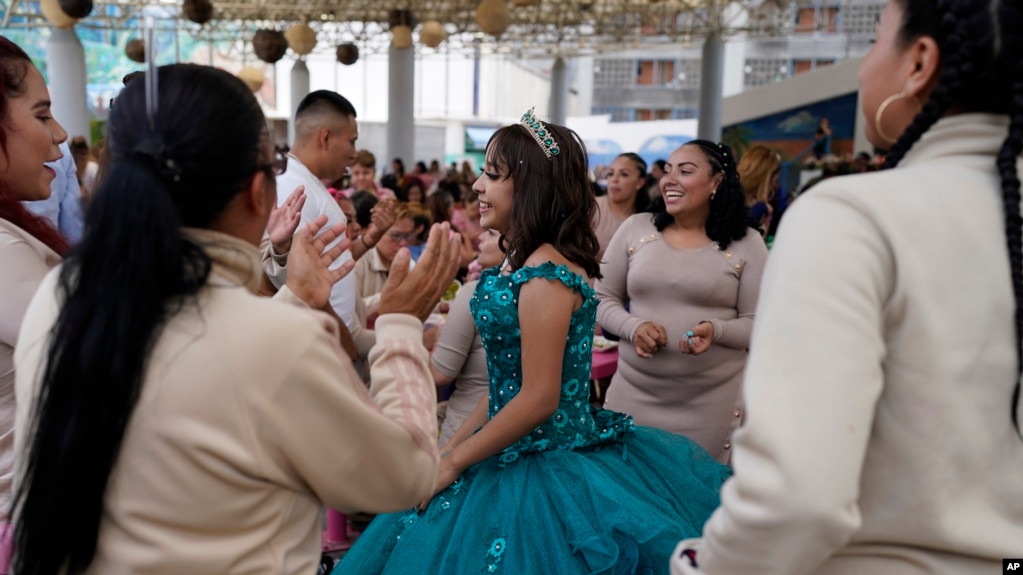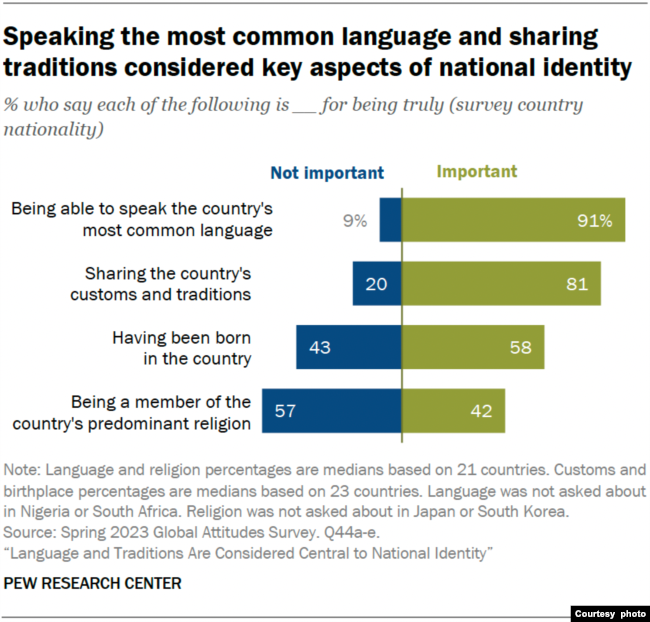AUDIO
Report: Language, Traditions Central to National Identity

Luciana de Oliveira considers herself transnational. That means she is more than one nationality. de Oliveira grew up in Brazil, but she moved to the United States for her studies. She became a U.S. citizen in 2017.
de Oliveira has some strong feelings about national identity. She believes speaking a country’s majority language is a very important part of one’s national identity. de Oliveira speaks both Portuguese and English.
A new study found that most people around the world share those feelings about language and national identity.
The Pew Research Center carried out the study and released the results last month. Pew’s study centered on people’s ideas about national identity. It included answers from people in more than 20 countries.
Pew researchers asked study participants about four aspects, or parts, of national identity: language, traditions, birthplace and religion. They found that language is by far the most valued aspect of national identity.

Speaking the most common language and sharing traditions are considered key to national identity.
In fact, a median of 91 percent of people across 21 countries said that speaking a country’s most common language is “important for being considered a true national.”
Traditions and customs are also key to national identity, the study found. Beliefs about the other two aspects – birthplace and religion – were more divided.
VOA Learning English spoke with several people who live in countries that were included in the study. Among them is Jorge Catalan. He has lived in Mexico most of his life. The Pew study found that 93 percent of respondents from Mexico said that speaking the country’s main language – Spanish – is important to national identity.
Catalan said he agrees that speaking Spanish is very important. But he added that it is regrettable.
He said, “Mexico is a place where we have around 68 spoken languages besides Spanish.” He noted that the government has pushed Spanish as the main language throughout history and has turned it into a “must-have tool.”
Agatha Janzen was born and raised in Canada. Pew researchers found that more than 80 percent of Canadians say that speaking the country’s language is important to national identity. In Canada, both French and English are official languages.
Janzen said that “speaking one of the official languages is important to being Canadian for practical reasons.”
Traditions and customs are also a central aspect of national identity, the study found. Results showed 81 percent of people believe sharing their country’s customs and traditions is somewhat or very important to national identity.
The Pew study found that 67 percent of Brazilians consider practicing customs and traditions an important part of national identity. That is the fourth lowest percentage of all the countries included in the study.
But customs and traditions are important to de Oliveira. To feel closer to her Brazilian identity, she said she wears jewelry and shoes from Brazil and follows and supports Brazilian soccer.

Luciana de Oliveira wears jewelry from Brazil to keep her sense of Brazilian identity.
Mexico is tied with the highest percentage of respondents who answered that customs and traditions are an important aspect of national identity. But for Catalan, they are not so important. He noted that Mexican traditions have changed over time. He added that he does not take part in many Mexican traditions, “but I still feel proudly Mexican.”
Beliefs about the two other aspects of national identity – birthplace and religion – were more mixed. A median of 58 percent of respondents from 23 countries said that being born in a country is important to national identity. An even lower number of respondents – 42 percent – said that being a member of the country’s main religion is important to national identity.
Respondents from Mexico and Indonesia had the strongest feelings about the importance of birthplace as central to national identity, at 91 percent.
Calatan, who was born and lived most of his life in Mexico, agrees somewhat. “If you are born outside of Mexico and never lived in it, it would be difficult to get a real sense of what being Mexican means.”
But Janzen, the Canadian, said, "Being born in Canada has nothing to do with being Canadian.” For her, Canada is a melting pot and offers refuge to those who need it.
These ideas match the results of the study. Countries where immigrants make up a smaller share of the population tend to see birthplace as a more important aspect of national identity. Countries with a greater share of immigrants are more willing to accept those born outside of the country as true nationals.
Less than half of people in most of the countries in the study do not feel religion is important to national identity. All of those who spoke with Learning English said they agreed that religion is not an important part of national identity.
Christine Huang is a research associate at the Pew Research Center. She is one of the writers of the study. She told Learning English, “This question of belonging in a country is related to other work we have done to measure how connected people feel to each other.”
Huang added, “When looking at how people relate to others in their community, in their country, and all over the world, people most frequently report feeling close to others in their country.”
Words in This Story
respondent—n. a person who answers questions
customs—n. the traditionally accepted behaviors of a culture
key—adj. most important
participants—adj. people who take part in an activity
practical—adj. real situations and events, not just theory or ideas
proud—adj. feeling pleasure or satisfaction about something
melting pot—figure of speech. a place where different people, beliefs, and cultures melt into one
https://learningenglish.voanews.com/a/report-language-traditions-central-to-national-identity/7496623.html